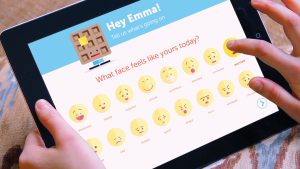
Photo by Dongho Kim on Unsplash
As I was reflecting on technology use within the infant/adult dyad, I remembered an article from a previous class, A threat to childhood innocence or the future of learning? Parents’ perspectives on the use of touch-screen technology by 0–3 year-olds in the UK by O’Connor and Fotakopoulou (2018). In it the authours conducted a study on the relationship between parents’ perspectives and young children’s use of touchscreen technology. I was also drawn to a study recommended by a peer on tech use by a toddler within the social context of her family as a form of multimodal literacy. The article was ‘i’Babies: Infants’ and toddlers’ emergent language and literacy in a digital culture of iDevices by Harrison and McTavish (2018).
In their article, O’Connor and Fotakopoulou raised a seemingly obvious point, that need to be articulated none the less: parents’ views on the appropriateness of tech use for young children determines the degree to which they allow their children to access it. I further posit that parents’ views also determine the degree to which they mediate their children’s tech use.
Harrison and McTavish remind us that as we consider multiliteracies and the skills associated with them, we must also consider that tech use is a literacy as well. However, O’Connor and Fotakopoulou acknowledge that many do not accept touchscreen use (and other tech skills) as a part of “normal development and “reflects a conceptual separation between technological skills and other skills that young children need to develop, as well as a common bias towards more ‘natural’ occupations for very young children.”
Discourses of childhood
O’Connor and Fotakopoulou went on to assert that the there are competing discourses of childhood and depending on how an individual views children and childhood their attitudes toward tech use among children will be either positive or negative.
The first discourse they identified is that childhood is a natural time of innocence, and children need to be protected from the harsh, polluting influence of the adult world. This leads to protectionist behaviour toward children, and people who hold this view tend to protect children’s innocence from the dangers of tech use.
The second discourse recognizes the opportunities that technology offers children. This is a future oriented view where children build important skills that will enable them to effectively navigate the future worlds of education and work.
Parents’ views
“Parents are the main gatekeepers of their young children’s use of technology. It follows, then, that their beliefs and behaviour in relation to parenting, child development and learning are going to be instrumental in the access their 0-3s have to this technology.” (O’Connor & Fotakopoulou, 2016, p. 236)
In their study, O’Connor and Fotakopoulou found that both discourses were represented. Many “parents encouraged and supported their children’s early experiences with digital technologies” for the perceived future benefits. Harrison and McTavish also report that studies find that parents make time for young children to play on tablets, especially with open-ended educational apps.
“This awareness of the need for future technological skills has not been documented before in relation to children as young as this and is an important indicator of the impact touch screens may be having on perceptions around very early childhood education and play.” (O’Connor & Fotakopoulou, 2016, p. 241)
Parents also expressed concerns about the potential dangers of touchscreen use such as accessing inappropriate content and the possible negative impact on social and communication skills. These fears represent thinking within the ‘natural childhood’ discourse, where the innocence of childhood needs to be protected.
Although I am not a parent, I have been thinking about my own views on children and technology and talking to others. In my line of work, I have access to several parents of infants and have been casually collecting viewpoints. The parents I’ve spoken to tended to lean toward a more protectionist view, and heavily limit their children’s use of digital tech, although the second discourse was represented as well.
The seductive nature of touchscreens
A worry expressed by some of the parents I spoke to was the seemingly addictive nature of touchscreens (and other screens). This was also taken up in the literature and Harrison and McTavish described a scene where their toddler subject woke from a nap and immediately sought out her mother’s phone to watch videos before even greeting her mother. O’Connor and Fotakopoulou also reported that parents were concerned about how ‘the iPad version of reality [was] more colourful, easier and more appealing than real life e.g. colouring in an iPad [was] much easier than on real paper with real pens”.
How children use tech
The 23 month-old subject of Harrison’s and McTavish’s study demonstrated sophisticated manipulation of the software on the touchscreen devices she used. She used her index fingers and thumbs to tap, swipe, and expand certain areas. She was able to navigate to her favourite apps and galleries and within YouTube.
Both articles discussed children using touchscreens to FaceTime or video chat with absent family members, and according to O’Connor and Fotakopoulou, this was the least contentious use of touchscreens. Educational apps, and games were also used by participants in both studies.
Although not identified in O’Connor’s and Fotakopoulou’s questionnaire, Harrison and McTavish reported that their study participant’s use of touchscreen technology was heavily mediated by family members.
Parental mediation
“Ally interacts both culturally and socially with her family members through her smartphone and tablet activities. Ally’s family members are constantly mediating her use of symbolic tools (iDevices) simply because an iDevice belongs to that member and they have a vested interest that Ally does not accidently Skype or text someone inadvertently, or delete photos, contacts and apps. Hence, Ally’s interaction on these iDevices is, more often than not, a shared activity, which makes it inherently social.” (Harrison & McTavish, 2018, p. 184)
From all that I have read so far, there seems to be a growing consensus that when (or if) very young children use digital technologies such as touch screens that their use should be mediated by an engaged adult. This is in recognition of the fact that children learn through interaction with more experienced others (Vygotsky’s Sociocultural Theory).




Recent Comments